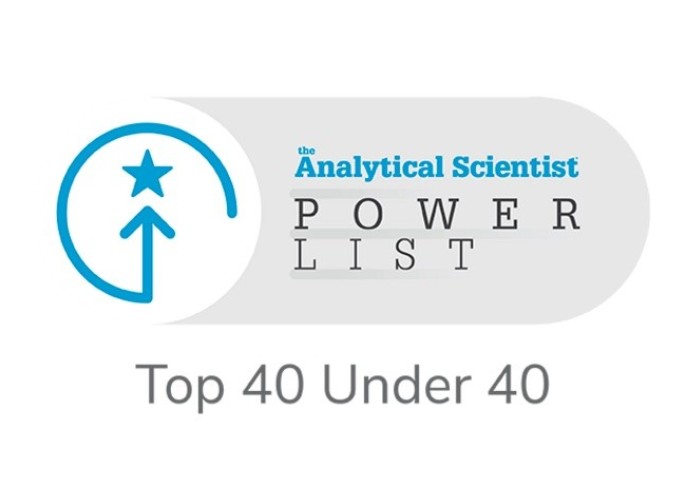Imperial researcher on the analytical science’s Top 40 Under 40 Power List 2022

A researcher in the Department of Surgery and Cancer has been recognised as one of 40 gifted young scientists making waves in analytical science.
Dr Ali Salehi-Reyhani, a lecturer in S&C, has been celebrated by the industry publication The Analytical Scientist as one of the young rising stars in the sector on their Top 40 Under 40 Power List, as nominated by readers and shortlisted by an independent panel of expert judges.
The list recognises gifted, inspiring, and sometimes overlooked young scientists who will, hopefully, provide the answers to the 21st century’s biggest questions. As part of this, each member of the list was asked to consider the current state of affairs in the sector, their predictions for the future, and their personal mission.
 In his response to considering the biggest challenges facing the field, Dr Salehi-Reyhani said: "Ultimately, I think the biggest challenge we face is the public perception of science, which should lead, one would hope, to the public support of science. Despite having come through a global pandemic on the back of biomedical science, the public perception of science seems more strained than ever. We might feel a little removed from the public but, as the field develops and as we translate instrumentation and techniques out of our labs into the clinic or the home, we will inevitably be faced squarely with public attitudes and perceptions. There are too many issues feeding into this problem, but soaring costs of education and public perceptions are key factors.
In his response to considering the biggest challenges facing the field, Dr Salehi-Reyhani said: "Ultimately, I think the biggest challenge we face is the public perception of science, which should lead, one would hope, to the public support of science. Despite having come through a global pandemic on the back of biomedical science, the public perception of science seems more strained than ever. We might feel a little removed from the public but, as the field develops and as we translate instrumentation and techniques out of our labs into the clinic or the home, we will inevitably be faced squarely with public attitudes and perceptions. There are too many issues feeding into this problem, but soaring costs of education and public perceptions are key factors.
"It will take collective action; as scientists, we need to think about how our roles extend beyond academia and what responsibility we have, or are willing to have, in the foundational aspects of science education and the public perception of science. Does this mean more or different approaches to outreach? Does this require a scientific body more engaged with policy, actively calling on our governments to accelerate investment in science and science teaching? I’m not sure."
I think the field will become ever more multidisciplinary in its approach and hopefully see the value in human factors and human centred design." Dr Ali Salehi-Reyhani Lecturer
Discussing his predictions for the field in the next 5-10 years, Dr Salehi-Reyhani said: "Personal health monitoring has been supercharged in the last few years and is a good case with which to make this point of driving progress for individual and societal needs. We need cutting-edge but cost-effective technology to decentralise and democratise healthcare. I want to build a legacy that, through thriving and innovative research, can help everyone lead healthier, longer and richer lives free from the spectre of disease. Analytical and measurement science will be central to developing solutions. Yet, our analytical chemistry labs are often removed from the clinic or the patient and we innovate in a vacuum. Unless we change our approach we will ultimately fail to make a wider impact on society.
"As a field, our approach tends, perhaps naturally, to be an ‘engineering’ one – a technical focus where we often approach development removed from the actual problem we’re trying to solve. I think the field will become ever more multidisciplinary in its approach and hopefully see the value in human factors and human-centred design. Our starting focus must be the users, whether they be consumers or patients. Then the technology must fit around that, not the other way around. Of course, this shouldn’t be confused with questioning the obvious validity of blue sky research but with making sure we face the greater challenge of innovation led by the wider needs of public health. This requires a shift in our approach."
Finally, touching on his own mission and personal goals for the coming years, Dr Salehi-Reyhani said: "I want to focus on helping to build analytical communities through my work with CAMS-UK and IUPAC. CAMS-UK is a community dedicated to fostering connections between industrial and academic scientists to deliver world-class training, research and innovation. I co-chair the separation sciences grouping and we’re keen to build awareness. Only through a networked, team-based approach will we solve the grand challenges that face us."
Article text (excluding photos or graphics) © Imperial College London.
Photos and graphics subject to third party copyright used with permission or © Imperial College London.
Reporter
Benjie Coleman
Department of Surgery & Cancer